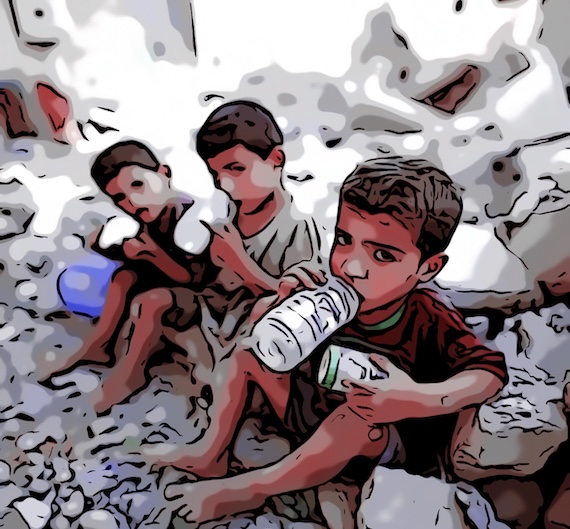Thousands of Palestinians have died because of Israeli efforts to choke off Gaza’s water supply. Immediate aid — and long-term infrastructure repairs — are essential to save lives.
( Foreign Policy in Focus ) – The current ceasefire agreement between Israel and Hamas does not include provisions that will aid in restoring access to water and sanitation. But without immediate action to reconnect electricity, provide a large influx of fuel, and allow in repair materials needed to rebuild water and sanitation infrastructure, Palestinians in Gaza will continue to be killed by disease, dehydration, and malnutrition.
Samer Zaqout, the deputy director of Palestinian civil society organization Al-Mezan and a Gaza resident, told Human Rights Watch four days into the ceasefire: “The big concern for us now is not pulling out bodies from the rubble and the massive destruction, the main problem is that people who are going home are not accessing necessities like water and electricity.”
Multiple models by doctors and epidemiologists estimate deaths caused by traumatic injury to be between 47,000 and 88,000. However, these estimates don’t take into account deaths from illness, hunger, and dehydration. In a letter to the Biden administration in October, 99 American physicians and nurses estimated that there were likely over 60,000 deaths attributable to malnutrition alone.
Based on our research at Human Rights Watch, Israeli authorities’ deprivation of water to the population of Gaza has most likely contributed to thousands of deaths.
The surge in aid alone under the ceasefire will not be enough to counteract the impacts of Israeli authorities’ actions on access to water and sanitation in Gaza over the last 15 months. What is needed is immediate action to restore electricity across Gaza — and a large influx of repair materials and water and sanitation experts to help rebuild the significant swathes of damaged water and sanitation infrastructure.
Maher Najjar, the deputy director of Gaza’s Coastal Municipalities Water Utility, Gaza’s main water authority, told Human Rights Watch, “People are still struggling to access the water from the networks since the damages [to the network] are extensive.” He added that most people depend on water brought in by trucks, which is insufficient to meet their needs.
The overall damage to water infrastructure in Gaza during the hostilities has been massive. In January, the World Bank and Ipsos, a market research firm, estimated that nearly 60 percent of Gaza’s water and sanitation infrastructure had been damaged or destroyed during the hostilities. By August 2024, they reported, 84.6 percent of the water and sanitation infrastructure had been destroyed or damaged.
While it was not possible in these reports to determine the party responsible for the damage or destruction, Human Rights Watch found in a subsequent report that Israeli authorities and forces undertook a wide range of deliberate actions to deprive Palestinians in Gaza of access to water and sanitation.
Between October 2023 and at least September 2024, Israeli authorities and forces cut off and later restricted the water supply piped into Gaza from Israel; cut off the electricity supply from Israel to Gaza that was needed to operate water pumps, desalination plants, and sanitation infrastructure within Gaza; and blocked and later restricted the fuel needed to run generators in the absence of electricity.
They also damaged and in some cases deliberately destroyed water and sanitation infrastructure, including four of Gaza’s six wastewater facilities — and prevented repairs by blocking imports of nearly all water-related materials. Israeli strikes also killed water utility workers as they were trying to make repairs and destroyed the main water utility warehouse in Gaza, which housed $8 million worth of spare parts, equipment, and supplies critical to water production.

“Thirst,” Digital, Midjourney / Crop2Comic, 2025
Human Rights Watch found that these actions amounted to the crime against humanity of extermination as well as acts of genocide.
The Israeli Office of the Coordinator of Government Activities in the Territories — the Israeli military unit responsible for coordinating humanitarian aid to Gaza — stated on X on December 19 that the three pipelines supplying water to Gaza from Israel were providing people with an average of “107 liters [of water] per person in northern Gaza, 34 liter per person in central Gaza, and 20 liters per person in southern Gaza.”
Israel did not give a date range for the figures it was providing, but those figures are not consistent with the figures that the United Nations and others reported throughout the hostilities there. Many of these latter figures state that people in Gaza on average only had access to about 2 to 9 liters of water per person per day between October 2023 and July 2024 — well below the 15-liter minimum standard in emergency situations that the UN recommends.
They also are incongruous with the reality on the ground in Gaza. Palestinians told us they had been forced to drink brackish and dirty water to survive, and medical professionals and humanitarians described the devastating and life-threatening consequences of water deprivation throughout the hostilities.
“Without water and electricity restoration, even if partial, we’re still facing a catastrophe,” said Zaqout.
The water and sanitation infrastructure in Gaza will most likely take years to rebuild. In the interim, it’s critical for donor countries and humanitarian aid organizations to provide support for temporary solutions, including supplying desalination units and supporting urgently needed repairs, to improve water and sanitation access.
Until these steps are taken, the lives of thousands of Palestinians hang in the balance.
Niku Jafarnia is a Middle East researcher at Human Rights Watch.


 © 2026 All Rights Reserved
© 2026 All Rights Reserved